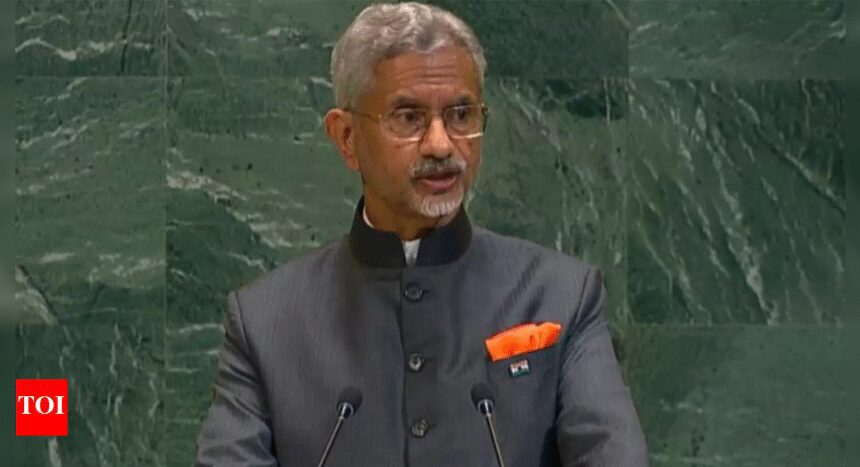India’s Foreign Minister S. Jaishankar issued a warning during his address at the United Nations General Assembly on Saturday, stating that nations that condone terrorism will ultimately face the consequences. While he did not name any specific country, his remarks were implicitly directed towards Pakistan, which he described as the epicenter of global terrorism. Jaishankar highlighted that many major international terrorist attacks trace back to Pakistan, pointing out that lists of designated terrorists frequently include individuals of Pakistani nationality.
Referencing a recent brutal attack, he mentioned the murder of innocent tourists in Pahalgam earlier this year. In response, India “exercised its right to defend its people and brought its organizers and perpetrators to justice.” Jaishankar emphasized the need for enhanced international cooperation in combating terrorism, stating, “When nations openly declare terrorism a state policy… such actions must be unequivocally condemned.”
In a separate statement, India’s representative at the UN rejected Pakistan’s claims of victory from a recent conflict, quipping that “if destroyed runways and burnt-out hangars look like victory… Pakistan is welcome to enjoy it.” The Indian representative asserted that it was the Pakistani military that sought a cessation of hostilities and urged Islamabad to close all terrorist camps and surrender individuals wanted in India.
During his rebuttal to Pakistan Prime Minister Shehbaz Sharif’s “absurd theatrics,” India’s first secretary, Petal Gahlot, reminded the assembly of Pakistan’s history of harboring key terrorists, including Osama bin Laden. Gahlot criticized Pakistan for attempting to present itself as a defender against terrorism while being accused of sheltering terrorist organizations.
Gahlot also noted that Pakistan has previously shielded terror groups before the United Nations Security Council, specifically mentioning the “Resistance Front,” which has been implicated in attacks on Indian civilians, including the Pahalgam massacre. He stated unequivocally, “This is the very same Pakistan which… sheltered ‘The Resistance Front’.”
The Indian diplomat reinforced New Delhi’s long-held stance that bilateral discussions should address outstanding issues between India and Pakistan, dismissing any suggestions for third-party mediation. Following U.S. President Trump’s earlier claims of acting as a mediator, Washington has reverted to its position advocating for bilateral dialogue.
Sharif, in his address, claimed that Pakistan’s “sacrifices” as a bulwark against terrorism should be acknowledged, stating that if these terrorists were not confronted by Pakistan, they could threaten global cities. This led Gahlot to highlight the global ramifications of Pakistan-based terrorism, citing notable terrorists linked to acts of violence in various countries.
In conclusion, Gahlot asserted India’s position that both terrorists and their state sponsors would be held accountable. He emphasized that terrorism would not be allowed to flourish under the guise of nuclear threats, making it clear that India’s stance remains firm against any forms of terrorism emanating from Pakistan.









